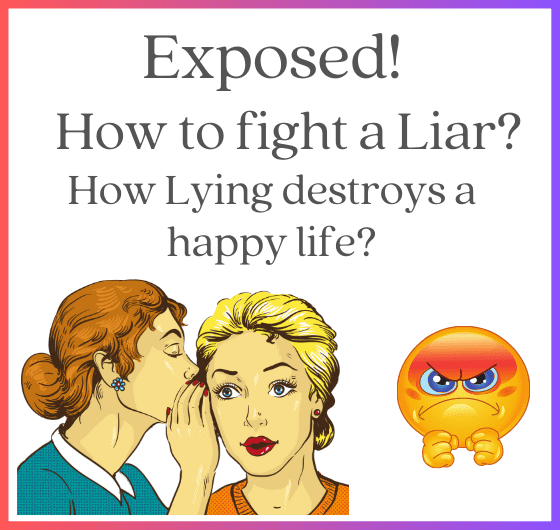Life is like a big puzzle, and honesty is an important piece that brings us happiness. Think about happiness as a bright sunbeam that can fade if we tell lies. Imagine if everyone told the truth, like a big family sharing secrets. In that world, happiness would shine like a happy festival.
Lying is like a crack in a special vase of trust. With time, these cracks can grow and spoil our relationships. Imagine this: You say you can’t come out to play, but your friend sees you playing. Your friendship, built on trust, might start breaking like a fragile toy.
“Lies are like chains that bind us to an alternate reality, preventing us from embracing the freedom of truth”
Honesty is a super important thing in life. It’s like a strong rope that holds friendships, the key to trust in love, and the base of a happy life. So, let’s keep the truth close, value trust, and watch happiness grow like a big garden. Remember, a life without lies is a life full of happiness.
For example, let’s say you tell your friends you can’t meet up because you’re busy, but they see you at a nearby cafe. Your friendship might start to break, just like a sandcastle does when the waves wash over it.
Honesty is like strong glue. It keeps our friendships solid, makes our love stronger, and helps us have a happy life. So, let’s always tell the truth and keep our trust strong. When we do that, happiness will grow like wildflowers in a garden.
Why do liars get angry when confronted?
Have you ever wondered why people who tell lies often get angry when someone questions them? It’s like a puzzle, but it’s because lies can feel like a fragile house of cards. When the truth starts knocking, it threatens to make that house collapse. Think about it this way: if you build a sandcastle on the beach and someone comes too close, you might feel worried that it will crumble.
The scars left by lies are reminders of the wounds inflicted upon trust and honesty
Lies and anger have a tricky connection. When a liar is confronted, anger can be like a shield they use to protect themselves. They might be scared that the truth will come out, and their lie will be exposed. Just like a kid caught with their hand in the cookie jar might get mad to hide their guilt.
Honesty, on the other hand, is like a strong fort. It might feel scary to admit a mistake, but it builds trust and keeps us feeling good. Imagine a friendship based on honesty – it’s like a cozy blanket on a chilly day. So, next time you see someone getting angry when questioned, remember, it could be because their house of lies is shaking.
Now, why is this important to understand in our lives? Well, it teaches us that honesty is not only about telling the truth but also about accepting the truth when we’ve been dishonest. When we confront a lie with kindness and patience, it creates a space for open communication. This can strengthen relationships and build trust.
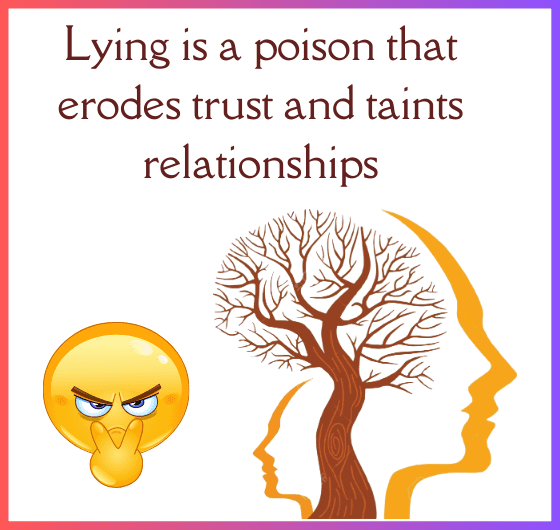
Do liars feel guilty?
A lie is a seed that grows into a garden of doubt and suspicion.
Ever wondered if liars feel guilty about their fibs? It’s a question that tugs at the threads of honesty and human nature. Imagine borrowing a friend’s favorite book and accidentally spilling something on it. If you lie and say it wasn’t you, there’s a chance you might feel guilty deep down.
Understanding whether liars feel guilty is important in our lives. Guilt often creeps in because lying doesn’t align with our true selves. Just like shadows can’t exist without light, guilt can’t stay away when honesty is hidden. When we lie, it’s like building a house of cards – it might look okay for a while, but it’s fragile and easily falls apart.
When someone tells a lie, there’s often a nagging feeling of guilt that lingers. Imagine you’ve promised your friend to help with a project but make up an excuse not to. That guilt you feel can eat away at your peace of mind.
Understanding this is important in our lives because it reminds us of the significance of honesty. Honesty isn’t just about telling the truth; it’s about living a guilt-free life. When we’re truthful, we don’t carry the heavy burden of guilt. This not only keeps our conscience clear but also strengthens our relationships with others.
How Lying Induces Guilt.
Lying is like a shadow that follows us, and it often brings along its companion: guilt. Imagine this scenario – you tell your friend you’re too busy to attend their birthday party, but you’re actually going to another event. As you celebrate at the second party, a feeling of guilt starts to creep in. It’s like a little voice inside you reminding you of the untruth you told.
“Lies are like termites, silently devouring the structure of truth and authenticity”
Understanding this connection between lying and guilt is vital in our lives. When we lie, it’s like planting a seed of unease within us. This seed grows into a tree of guilt that casts a heavy shadow on our happiness. Just as a wound needs healing, guilt demands resolution. It’s a sign that our conscience recognizes the disconnect between our actions and our values.
Consider this: a garden flourishes when its soil is tended to, and our happiness blossoms when we nurture honesty. When we embrace truthfulness, we create a harmonious symphony between our actions and our heart’s melody. So, let’s remember, that honesty isn’t just a virtue; it’s a path to liberation from the weight of guilt, leading us towards a more joyful and authentic life.
Consider this real-life example: Imagine you copied your friend’s answers during an exam and got a good grade. On the surface, it might seem like a win, but that achievement would taste sour because you know you didn’t earn it honestly. The guilt can overshadow the success, leaving you feeling empty.
In conclusion, understanding the relationship between lying and guilt is a step towards leading a more genuine life. By choosing honesty over deceit, we not only nurture our relationships but also keep our hearts free from the weight of guilt. Remember, the road to true happiness is paved with the stones of honesty, leading us to a life where our actions align with our values and our hearts remain light.
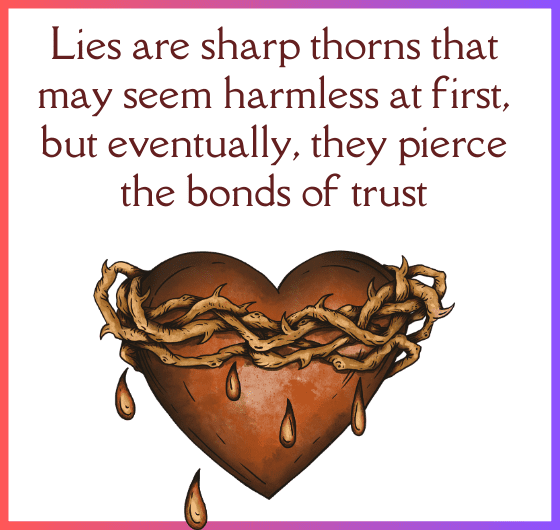
How do you fight a liar?
“Lies are sharp thorns that may seem harmless at first, but eventually, they pierce the bonds of trust”
Facing a liar can be like navigating a maze, but there are simple strategies that help you uncover the truth. Imagine a friend promising to help with a project but then avoiding it. You suspect they’re lying.
The first step is to stay calm. Like a detective, gather evidence by asking questions gently. This approach can make liars uncomfortable, leading them to reveal more.
Why is this important? Trust is the backbone of relationships, and confronting lies can strengthen or shatter it. One way is to provide a safe space. Share your feelings, making them realize the impact of their actions. Real-life examples, like explaining how their lie hurt your trust, can be a wake-up call.
Remember, accusations can lead to defensiveness. Instead, let them know you want to understand their perspective. This approach can lead to open conversations. While it’s easy to get angry, it’s better to seek resolution. By using patience and kindness, you pave a path to healing.
Imagine the power of empathy. If you caught someone lying, consider why they might have done it. Were they afraid of disappointing you? This understanding can bridge the gap between you.
Understanding how lying induces guilt is essential in our lives. When we tell a lie, it’s like creating a crack in our heart’s mirror. With time, that crack widens, and the reflection of our true self gets distorted. Think about it – when we’re dishonest, we know deep down that we’re not being true to ourselves or to others.
In the end, the fight against lies is about restoring honesty and trust. It’s like fixing a torn page in a book; it may leave a mark, but the story can continue. So, let’s remember, that while it’s not easy, confronting lies can lead to growth. By embracing open dialogue and understanding, we can build bridges, mend bonds, and create a life enriched with authenticity and meaningful connections.
What do liars usually say?
Lying is a poison that erodes trust and taints relationships
Liars weave tales like skilled storytellers, often crafting intricate narratives to hide the truth. Imagine a friend who claims they’re sick to avoid helping with a task, only to post pictures of a day out later. It’s these little stories that reveal the art of deception.
Understanding what liars usually say is essential in our lives. They might use phrases like “I didn’t do it,” “I swear,” or “I have proof.” These statements are like smoke screens, meant to divert attention from their untruths. Recognizing these patterns helps us see beyond their words and into their intentions.
Consider this: a painting’s beauty lies in its true colors, and our connections flourish when they’re based on honesty. By staying alert and looking for inconsistencies, we encourage a world where transparency reigns. So, let’s remember, that the power of honesty shines brighter than the fanciest tale. When we value truth, we foster a culture of trust, respect, and integrity.
In conclusion, understanding the language of lies empowers us to navigate relationships with clarity and wisdom. By recognizing the patterns and cues of dishonesty, we promote open dialogue and create bonds that stand strong in the face of deceit. Let’s embrace the truth as our compass, guiding us towards connections that are built on solid foundations of honesty.
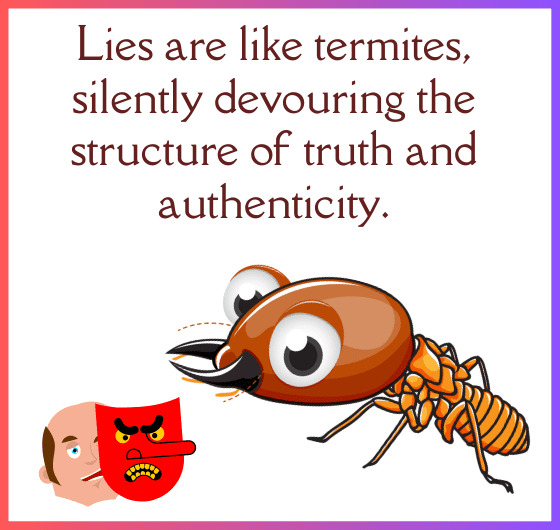
How do liars react
The harm in lying isn’t just in the words spoken, but in the erosion of the character behind them.
Liars often react in ways that give away their deception, much like leaves rustling in the wind. Imagine you ask a friend about a missing item, and they suddenly become defensive or avoidant. These reactions can be telling signs of untruths.
Understanding how liars react is crucial in our lives. They might become fidgety, change the subject, or get overly defensive. These behaviors are like red flags, alerting us to potential dishonesty. Recognizing these signs helps us differentiate between truth and deception.
Consider this: just as a river finds its way around obstacles, truth reveals itself despite attempts to conceal it. By observing changes in tone, body language, or evasiveness, we open a door to open conversation. Let’s remember, that choosing honesty over lies is like choosing sunlight over shadows. When we promote truthfulness, we foster relationships built on trust and integrity.
In conclusion, understanding the reactions of liars equips us with a valuable tool for navigating interactions. By paying attention to the signs, we empower ourselves to foster a culture of transparency and open dialogue. Let’s embrace the power of observation and communication as we journey toward a world where honesty reigns and connections flourish.
Story:
Story of a monk teaching his students why lying is bad.
Once upon a time in a quiet monastery nestled in the heart of a village, lived a wise monk named Master Anand and his curious disciple, Arjun. Master Anand was not just known for his spirituality but also for his profound life lessons. One sunny morning, they sat under a sacred tree for a conversation that would forever change Arjun’s perspective.
“Master, why is lying bad?” asked Arjun with genuine curiosity.
Master Anand smiled gently. “Arjun, let me tell you a story. Imagine a small pebble dropped into a calm pond. The ripples spread far and wide, disrupting the tranquility. Just like that, a lie disrupts the peace of our heart.”
Arjun’s eyes widened. “But why does a lie disturb us?”
Master Anand replied, “A lie brings more than just untruth into the world. It plants seeds of guilt and stress within us. Let’s say you told your friend you couldn’t go to the market because you were studying, but you actually wanted to play. Later, when you meet your friend, your heart may feel heavy with guilt, like carrying a rock wherever you go.”
Arjun nodded, absorbing the lesson. “So, what can we do instead, Master?”
Master Anand’s gaze was kind yet firm. “We can choose the path of truth, my dear Arjun. Like a river flowing smoothly, honesty keeps our hearts serene. When we speak the truth, we remain free from guilt and stress.”
“But what if the truth hurts someone?” Arjun wondered.
Master Anand nodded thoughtfully. “Ah, that’s where kindness comes in. Truth need not be harsh. It can be gentle, like a soft breeze. Imagine if you accidentally broke your sister’s toy. Instead of lying, admit the mistake and apologize. It might bring a moment of discomfort, but it builds trust and prevents guilt.”
Arjun’s eyes sparkled with understanding. “So, leading a truthful life is important?”
Master Anand smiled warmly. “Indeed, Arjun. A truthful life is like a blossoming garden. It starts with honesty towards yourself. Recognize your flaws and strengths. Then, extend this truthfulness to your actions and words. When your inner world aligns with your outer world, you experience true peace.”
Arjun’s heart felt light with this wisdom. “How can we practice this, Master?”
Master Anand’s voice held wisdom. “Begin with small steps. Every truth you speak strengthens your resolve. Remember, a single lie is like a crack in a vase – it weakens it. But a life of truth builds a strong, beautiful vase of character.”
As the sun set, Arjun felt a sense of purpose. Master Anand’s words had lit a torch within him. He understood that honesty wasn’t just about telling the truth; it was a path to inner harmony, where guilt and stress had no place.
From that day on, Arjun embraced the teachings of truth and kindness. He nurtured the garden of his heart with authenticity, watered it with honesty, and watched it bloom into a life of peace and joy. And so, the monastery’s sacred tree continued to witness the beautiful journey of a young disciple led by the wisdom of his compassionate Master, towards a life of integrity and truth.
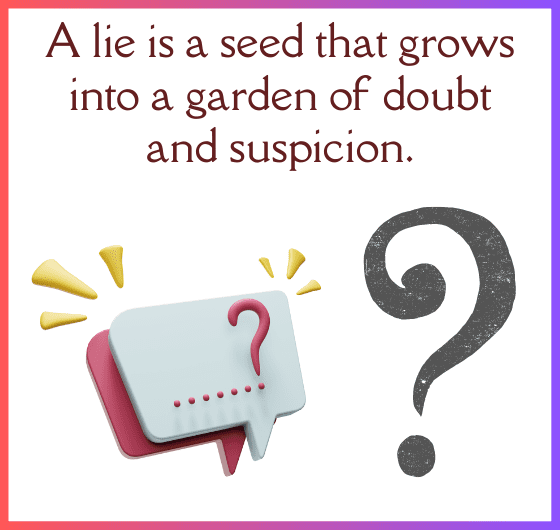
20 true and bitter reality facts about lying
1.. Lies often start small, but they can snowball into complex webs of deceit.
2. The more we lie, the easier it becomes to overlook the truth.
3. Lying can erode trust, even in the strongest relationships.
4. Lies can cause a constant state of stress due to the fear of getting caught.
5. Deception can damage our self-esteem and self-worth.
6. Lies can strain our memory as we try to remember the intricate details of our falsehoods.
7. When caught in a lie, it’s common for liars to become defensive or even angry.
8. Small lies can lead to bigger lies to cover up the initial untruths.
9. Lying can isolate us emotionally, making us feel disconnected from others.
10. Trust takes time to build but can be shattered with a single lie.
11. Lying can lead to a cycle of guilt, anxiety, and more lying to cope.
12. Honest communication is essential for healthy relationships.
13. Lies often come to light eventually, leading to embarrassment and shame.
14. Lying can damage our reputation and credibility, both personally and professionally.
15. Being known as a liar can hinder personal growth and opportunities.
16. People are generally less likely to believe someone who has a history of lying.
17. Lying can cause us to doubt others’ sincerity, making us skeptical of everyone.
18. Lies can escalate conflicts and misunderstandings.
19. Deceit can distance us from our true selves and values.
20. Honest conversations, even when difficult, lead to stronger connections and inner peace.
Remember, embracing honesty might be tough at times, but its rewards in personal growth, better relationships, and genuine happiness are worth every effort.
The web of lies we weave eventually ensnares us in a trap of our own makin
15 reasons why lying is bad
1.. Erodes Trust: Lying breaks the foundation of trust in relationships, making it difficult to believe someone’s words.
2. Hurts Others: Lies can cause emotional pain and damage to those who believe them.
3. Strains Relationships: Consistent lying strains relationships and can lead to misunderstandings.
4. Guilt and Stress: Lying induces guilt and stress, as the fear of being caught or the weight of deceit takes a toll.
5. Compounds Lies: One lie often leads to more lies, making it hard to keep track of the falsehoods.
6. Damages Reputation: Repeated lying damages one’s reputation and credibility.
7. Isolates Individuals: Lies can isolate people emotionally, leaving them feeling disconnected.
8. Harms Self-Esteem: Being dishonest can damage self-esteem and create internal conflict.
9. Prevents Growth: Lies hinder personal growth, as they prevent us from facing and learning from mistakes.
10. Breaks Promises: Lying breaks promises, hurting the faith others have in us.
11. Encourages Distrust: Habitual liars often invite skepticism, making it hard for others to trust them.
12. Leads to Confusion: Lies can lead to confusion and misunderstandings when the truth is uncovered.
13. Creates Unstable Ground: Lies create an unstable foundation for relationships, personal well-being, and success.
14. Diminishes Integrity: Consistently lying compromises one’s integrity and moral values.
15. Complicates Life: Maintaining lies requires effort and complicates life more than living truthfully.
Ultimately, honesty leads to more meaningful connections, personal growth, and inner peace, making it the better path to follow.
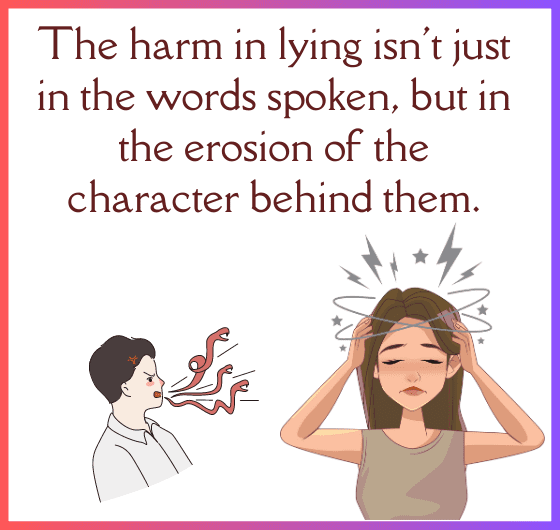
Why Staying Truthful is Important:
1.. Builds Trust: Truthfulness forms the basis of trust in relationships.
2. Foster’s Respect: Honest individuals are respected for their integrity.
3. Maintains Integrity: Truthfulness preserves one’s moral and ethical values.
4. Strengthens Bonds: Open communication strengthens connections with others.
5. Prevents Guilt: Staying truthful reduces the burden of guilt and stress.
6. Promotes Accountability: Truthfulness encourages taking responsibility for actions.
7. Encourages Openness: Honest conversations lead to authentic interactions.
8. Nurtures Self-Respect: Being truthful boosts self-esteem and self-worth.
9. Cultivates Empathy: Honest interactions foster understanding and empathy.
10. Ensures Transparency: Truthfulness promotes clarity and transparency.
11. Fuels Personal Growth: Facing truths allows for personal growth and learning.
12. Preserves Reputation: Truthful behavior maintains a positive reputation.
13. Promises Consistency: Staying truthful ensures consistency in words and actions.
14. Reduces Conflict: Honest communication reduces misunderstandings and conflicts.
15. Fosters Inner Peace: Truthfulness leads to a sense of inner tranquility.
16. Promotes Emotional Well-being: Honesty reduces emotional turmoil and stress.
17. Saves Time and Energy: Truthfulness eliminates the need for keeping track of lies.
18. Builds Stronger Communities: Truthful interactions create harmonious communities.
19. Sustains Good Character: Truthfulness is a hallmark of a strong character.
20. Inspires Others: Being truthful sets an example for others to follow.
How to Stay Truthful in Life:
** Reflect: Regularly examine your actions and words to ensure they align with truth.
** Practice Self-Awareness: Be mindful of your intentions and their impact.
** Choose Honesty: Prioritize telling the truth even when it’s challenging.
** Think Before You Speak: Pause to consider your words before expressing them.
** Be Accountable: Own up to mistakes and acknowledge when you’re wrong.
** Admit Imperfections: Embrace your flaws and be open about them.
** Value Openness: Encourage open communication in your relationships.
** Stay Consistent: Ensure that your words match your actions consistently.
** Avoid Exaggeration: Present facts accurately without unnecessary embellishments.
** Face Consequences: Accept the consequences of your actions truthfully.
** Practice Empathy: Understand how your words might affect others.
** Apologize Sincerely: Offer genuine apologies when you’ve been dishonest.
** Seek Feedback: Ask others to help you stay accountable for your truthfulness.
** Cultivate Integrity: Let your moral values guide your actions.
** Stay Transparent: Share information openly with others when needed.
** Embrace Vulnerability: Allow yourself to be open about your feelings.
** Avoid Gossip: Refrain from spreading rumors or sharing unverified information.
** Listen Actively: Pay attention to others’ perspectives and opinions.
** Set Honest Intentions: Approach situations with genuine intentions.
** Learn from Mistakes: When you slip, use it as an opportunity to grow and improve your truthfulness.
By adopting these practices, you can navigate life with integrity and foster meaningful relationships built on trust and authenticity.

